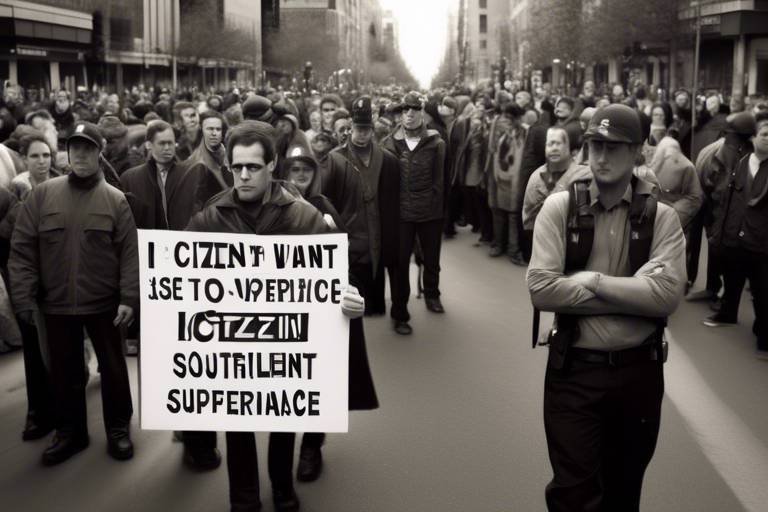The Morality of Recreational Drug Use - A Philosophical Debate
In today's world, the debate surrounding recreational drug use has become increasingly complex, intertwining ethical considerations with societal norms and individual freedoms. As we navigate through this intricate landscape, it’s essential to examine the ethical implications that arise from our choices regarding drug consumption. This article aims to explore the various philosophical perspectives that inform our understanding of morality in relation to recreational drug use, shedding light on the arguments for and against it.
To truly grasp the current debate on recreational drug use, we must first delve into its historical context. Throughout history, societies have embraced various substances for their psychoactive effects, often intertwining them with cultural rituals and social practices. For instance, indigenous communities have utilized natural drugs like peyote and psilocybin mushrooms for spiritual purposes, while the use of alcohol has been a staple in social gatherings for centuries. However, as societal attitudes shifted, particularly during the 20th century, many substances were criminalized, leading to a complex legal framework that often contradicts the historical acceptance of these drugs. This evolution of attitudes and laws has laid the groundwork for the ongoing discussions about the morality and legality of recreational drug use.
When it comes to the morality of drug use, different philosophical theories offer varied viewpoints. One of the most notable frameworks is utilitarianism, which evaluates the morality of actions based on their consequences. Advocates of this perspective argue that if recreational drug use leads to greater overall happiness, then it can be deemed morally acceptable. Conversely, deontological ethics focuses on the morality of the actions themselves, raising critical questions about individual rights and the ethical implications of drug prohibition. By examining these philosophical lenses, we can better understand the multifaceted nature of the debate surrounding recreational drug use.
Utilitarianism posits that the rightness or wrongness of an action is determined by its outcomes. In the context of recreational drug use, this perspective prompts us to consider the overall happiness and harm associated with such activities. Proponents argue that recreational drug use can lead to significant benefits, including:
- Enhanced Well-Being: Many users report increased happiness and relaxation when consuming certain substances.
- Creativity Boost: Some drugs are believed to enhance creativity and problem-solving abilities.
- Social Connections: Recreational drug use can foster social interactions and bonding experiences.
However, it’s crucial to weigh these benefits against the potential risks and harms associated with recreational drug use.
Supporters of recreational drug use highlight its potential to enhance personal experiences and well-being. For instance, substances like cannabis and psychedelics have been reported to foster creativity, deepen social connections, and even promote therapeutic insights. The argument here is that when used responsibly, these substances can contribute positively to an individual’s quality of life and, by extension, society as a whole.
On the flip side, critics emphasize the dangers of recreational drug use, including addiction, health issues, and societal costs. They argue that the potential for addiction can lead to a cycle of dependency, negatively impacting not only the individual but also their families and communities. Furthermore, the societal costs associated with drug use—such as increased healthcare expenses and crime rates—raise significant ethical concerns. This duality of benefits and harms invites a deeper examination of whether the advantages of recreational drug use truly outweigh the risks.
From a deontological perspective, the morality of drug use hinges on the actions themselves rather than their consequences. This raises important questions about individual rights and the ethical implications of drug prohibition. Advocates for drug use often argue that adults should have the autonomy to make choices about their own bodies, including the substances they consume. However, this perspective also invites counterarguments regarding responsibility and the potential for harm to oneself and others.
The implications of recreational drug use extend beyond individual choices, affecting public health, crime rates, and economic factors. Understanding these societal impacts is crucial for informing the broader conversation about morality and legality. For instance, the relationship between recreational drug use and public health is complex, involving discussions on harm reduction strategies, addiction treatment, and education.
Public health discussions around recreational drug use often focus on harm reduction strategies, which aim to minimize the negative consequences associated with drug consumption. These strategies can include providing safe consumption spaces, access to addiction treatment, and educational programs about responsible use. By adopting a public health approach, society can address the potential risks while respecting individual autonomy.
The criminalization of drug use raises ethical questions about justice and equity. Many argue that current drug policies disproportionately affect marginalized communities, leading to systemic injustices. This has sparked debates on legalization and regulation, with proponents advocating for a shift towards a more equitable and effective approach to drug policy.
At the heart of the debate on recreational drug use lies the question of personal freedom and autonomy. Advocates for drug use emphasize the importance of individual choice, arguing that adults should have the right to decide what substances to consume. This perspective aligns with broader discussions about personal liberties in society.
Supporters of drug use assert that individuals should have the autonomy to make choices regarding their own bodies. This argument is rooted in the belief that personal freedom is a fundamental right that should not be infringed upon by governmental regulations. They argue that responsible adults can make informed decisions about their drug use without needing external guidance.
On the other hand, opponents contend that personal freedom must be balanced with societal responsibilities. They question whether individuals can truly make informed choices about drug use without external guidance, especially considering the potential for addiction and health risks. This ongoing tension between personal freedom and societal responsibility is a central theme in the debate over recreational drug use.
As the discussion around recreational drug use continues to evolve, many questions arise. Here are some frequently asked questions that capture the essence of this complex debate:
- What are the main arguments for and against recreational drug use?
- How does historical context influence current drug policies?
- What role do individual rights play in the debate over drug use?
- How can society balance personal freedom with public health concerns?

Historical Context of Drug Use
Understanding the historical background of recreational drug use is crucial for framing the current debate on its morality and legality. Throughout history, humans have sought out various substances for their psychoactive effects, often intertwining these practices with cultural and spiritual rituals. For instance, ancient civilizations like the Mesopotamians and the Indigenous peoples of the Americas utilized plants such as cannabis and peyote in religious ceremonies, viewing them as sacred tools for connecting with the divine. This historical perspective reveals that drug use has not always been seen through a lens of morality or legality; rather, it has often been a part of human expression and cultural identity.
As we move through history, we see a significant shift in attitudes towards drug use. In the 19th century, substances like opium and cocaine were widely accepted and even marketed in various medicinal products. However, as the 20th century approached, societal perceptions began to change dramatically. The rise of the temperance movement, coupled with increasing awareness of addiction and health issues, led to the criminalization of many previously accepted substances. The War on Drugs initiated in the 1980s further entrenched the stigma surrounding drug use, with harsh penalties and a focus on prohibition rather than education and treatment.
In recent decades, there has been a noticeable shift again, with many advocating for decriminalization and legalization of certain drugs. This change reflects a growing recognition of the complex relationship between drug use, public health, and individual rights. As societies grapple with the consequences of past policies, the conversation around drug use continues to evolve, raising questions about how history shapes our current understanding of morality and legality in this contentious area.
To better understand these shifts, let's take a look at a brief timeline of key events in the history of drug use:
| Year | Event |
|---|---|
| 3000 BC | Use of opium in ancient Sumeria for medicinal purposes. |
| 1500s | Coca leaves used by Indigenous peoples in South America. |
| 19th Century | Cocaine and opium widely used in medical preparations. |
| 1970 | Controlled Substances Act passed in the U.S., regulating drug use. |
| 1980s | War on Drugs intensifies, leading to stricter penalties. |
| 2010s | Growing movement for legalization of marijuana and drug decriminalization. |
This historical context not only highlights the changing perceptions of drug use but also emphasizes the need for a nuanced discussion about its morality. As we delve into the philosophical perspectives on this issue, it becomes clear that understanding our past is essential for navigating the complexities of drug use in contemporary society.

Philosophical Perspectives
The morality of recreational drug use is a multifaceted debate that draws heavily on various philosophical theories. Each perspective offers unique insights that can either support or challenge the notion of drug consumption as a moral issue. From the consequentialist views of utilitarianism to the rule-based approach of deontological ethics, these philosophies provide a framework for understanding the ethical implications surrounding drug use. As we delve into these perspectives, we can better grasp how they shape public opinion and policy regarding recreational drugs.
Utilitarianism is perhaps the most prominent philosophical lens through which drug use is examined. This theory posits that the morality of an action is determined by its outcomes, specifically the overall happiness or suffering it produces. In the context of recreational drug use, utilitarian arguments often revolve around the balance of pleasure and pain. Proponents of drug use may argue that certain substances can enhance well-being, creativity, and social interactions, thereby contributing positively to individual lives and society at large. For example, substances like cannabis are often cited for their potential to alleviate stress and promote relaxation. However, the utilitarian perspective also requires a critical examination of the potential harms associated with drug use, such as addiction and health risks. Thus, the debate becomes a weighing scale of benefits versus harms, leading to questions like: Do the joys of recreational drug use outweigh the potential dangers?
On the flip side, deontological ethics provides a contrasting viewpoint that focuses on the morality of actions themselves, rather than their consequences. This perspective raises important questions about individual rights and the ethical implications of drug prohibition. Deontologists may argue that individuals possess an inherent right to make choices about their own bodies, including the decision to consume drugs. This argument aligns with the broader principles of personal autonomy and freedom. However, critics of this view often highlight the societal responsibilities that come with such freedoms. They argue that while individuals may have the right to choose, those choices can impact others, thereby complicating the moral landscape. For instance, if a person's drug use leads to impaired driving and subsequently harms another individual, the ethical implications become murky.
In summary, the philosophical perspectives on recreational drug use present a rich tapestry of arguments and counterarguments. Utilitarianism encourages a focus on the outcomes of drug use, while deontological ethics emphasizes the rights of individuals to make personal choices. By understanding these frameworks, we can engage in more informed discussions about the morality and legality of recreational drug use, considering both the benefits and the potential pitfalls.
- What is utilitarianism? Utilitarianism is a philosophical theory that evaluates the morality of actions based on their consequences, specifically aiming to maximize happiness and minimize suffering.
- What are deontological ethics? Deontological ethics focuses on the morality of actions themselves rather than their outcomes, emphasizing individual rights and duties.
- How do these perspectives apply to drug use? Utilitarianism weighs the benefits and harms of drug use, while deontological ethics considers the rights of individuals to make personal choices about drug consumption.
- Can drug use be both moral and immoral? Yes, depending on the philosophical perspective one adopts, drug use can be seen as moral or immoral based on its consequences or the rights involved.

Utilitarianism and Drug Use
When we delve into the realm of utilitarianism and its application to drug use, we find ourselves grappling with a fundamental question: do the benefits of recreational drug use outweigh the potential harms? Utilitarianism, a philosophical theory primarily associated with thinkers like Jeremy Bentham and John Stuart Mill, posits that the morality of an action is determined by its consequences. This approach encourages us to evaluate the overall happiness or suffering that results from drug use, prompting a nuanced discussion on its implications.
Supporters of recreational drug use often argue that it can lead to significant positive outcomes. For instance, many users report enhanced well-being and increased creativity when indulging in certain substances. Social interactions can also flourish in environments where recreational drug use is accepted, fostering connections and a sense of community among users. The following are some of the potential benefits that advocates point to:
- Increased Creativity: Many artists and thinkers have claimed that certain drugs unlock new levels of creativity, allowing for innovative ideas and artistic expression.
- Social Bonding: Recreational drug use can serve as a social lubricant, helping individuals connect with others in a relaxed and open environment.
- Stress Relief: For some, drugs provide a temporary escape from the pressures of daily life, promoting relaxation and enjoyment.
However, this perspective isn't without its critics. Detractors of recreational drug use highlight the potential risks and harms associated with these substances. They argue that the negative consequences can overshadow the benefits, leading to a net decrease in overall happiness. Some of the key concerns include:
- Addiction: Many recreational drugs carry a risk of addiction, which can lead to a cascade of personal and societal problems.
- Health Issues: The physical and mental health risks associated with drug use can be severe, impacting not only the individual but also their families and communities.
- Societal Costs: The broader societal implications, such as increased healthcare costs and law enforcement resources, must also be taken into account.
In light of these arguments, the utilitarian perspective calls for a careful assessment of both sides. It invites us to consider questions such as: "Can we find a balance that maximizes happiness while minimizing harm?" and "What policies can we implement to mitigate the risks associated with recreational drug use?" As society continues to evolve and engage in this debate, the utilitarian framework provides a valuable lens through which to analyze the complexities of drug use and its implications for individual and collective well-being.
Q: What is utilitarianism?
A: Utilitarianism is a philosophical theory that suggests the best action is the one that maximizes overall happiness or well-being.
Q: How does utilitarianism apply to drug use?
A: Utilitarianism evaluates the morality of drug use based on its consequences, weighing the benefits against the potential harms to individuals and society.
Q: What are some benefits of recreational drug use?
A: Benefits can include increased creativity, social bonding, and stress relief.
Q: What risks are associated with recreational drug use?
A: Risks include addiction, health issues, and societal costs such as increased healthcare and law enforcement expenses.

Benefits of Recreational Drug Use
When diving into the conversation about the , it's essential to consider the myriad ways these substances can enhance individual experiences and societal interactions. While the debate often focuses on the negatives, a closer look reveals that, for many, recreational drug use can lead to significant positive outcomes. For instance, users often report enhanced creativity and a greater appreciation for art and music. Imagine a painter, inspired by the vibrant colors and emotions that a psychedelic experience can evoke, creating a masterpiece that resonates with countless others. This kind of creativity can contribute to cultural evolution, pushing boundaries and inspiring new movements.
Moreover, recreational drugs can facilitate social connections. In social settings, substances like cannabis or MDMA can help break down barriers, fostering a sense of community and belonging. People often find themselves more open and willing to engage in conversations that they might otherwise shy away from. It’s like a lubricant for social interactions, allowing individuals to express themselves more freely and connect on deeper levels. The laughter, shared experiences, and new friendships formed in these moments can be invaluable, creating lasting bonds that enrich lives.
Furthermore, many proponents argue that recreational drug use can serve as a form of self-exploration and therapy. Some users turn to substances not just for pleasure but for personal insight and emotional healing. For example, psychedelics like psilocybin and LSD have been studied for their potential in treating mental health issues such as depression and anxiety. Users often describe profound experiences that lead to significant shifts in perspective, helping them navigate their emotions and traumas. This therapeutic potential is a compelling argument for the decriminalization and responsible use of these substances.
Additionally, the economic benefits of legalizing recreational drugs cannot be overlooked. In regions where cannabis has been legalized, tax revenues have surged, leading to increased funding for public services like education and healthcare. This financial influx can create a ripple effect, improving community resources and infrastructure. Imagine a community where the tax revenue from legal drug sales is funneled into schools, parks, and health initiatives, ultimately benefiting everyone, regardless of their stance on drug use.
In summary, while the conversation around recreational drug use is complex, it’s crucial to acknowledge the potential benefits. From enhancing creativity and fostering social connections to offering therapeutic insights and boosting local economies, the positive aspects of recreational drug use present a compelling case for a more nuanced understanding of its role in society. As we continue to explore these benefits, we must also consider how to balance them with the associated risks, creating a responsible framework that maximizes positive outcomes for individuals and communities alike.
- What are the most common recreational drugs used today?
The most commonly used recreational drugs include cannabis, cocaine, MDMA, and psychedelics like LSD and psilocybin mushrooms. Each of these substances has its unique effects and potential benefits.
- Are there any health risks associated with recreational drug use?
Yes, recreational drug use can have health risks, including addiction, mental health issues, and physical health problems. It's vital for users to be informed and cautious.
- Can recreational drugs be used safely?
While some individuals use recreational drugs responsibly, safety largely depends on the substance, the context of use, and the individual's health. Education and harm reduction strategies are essential.

Risks and Harms
The debate surrounding recreational drug use is often clouded by a myriad of that critics vehemently point out. While advocates may tout the benefits, it's crucial to delve into the darker side of drug consumption. One cannot ignore the potential for addiction, which can ensnare individuals in a web of dependency, altering their lives and the lives of those around them. Addiction doesn't just affect the user; it can ripple through families, friendships, and communities, creating a cycle of despair that is hard to break.
Moreover, the health issues associated with drug use can be severe. From mental health disorders to physical ailments, the consequences can be devastating. For instance, substances like opioids can lead to chronic pain conditions and mental health issues such as depression or anxiety. The long-term effects of drug use can be like a shadow that looms over an individual's future, impacting their ability to function in society.
There are also significant societal costs tied to recreational drug use. Increased healthcare costs, loss of productivity, and the burden on the criminal justice system can all stem from widespread drug consumption. The financial implications can be staggering, with estimates suggesting that drug abuse costs the U.S. economy billions each year. This raises an essential question: are the benefits of recreational drug use worth the potential harm to individuals and society as a whole?
In light of these concerns, it's essential to consider the various dimensions of harm that recreational drug use can inflict. Below is a table summarizing some of the key risks associated with different types of substances:
| Substance | Potential Risks |
|---|---|
| Alcohol | Dependency, liver disease, impaired judgment, accidents |
| Marijuana | Memory impairment, anxiety, potential for addiction |
| Opioids | Addiction, overdose, respiratory issues |
| Cocaine | Heart issues, anxiety, addiction, legal problems |
| MDMA (Ecstasy) | Dehydration, anxiety, long-term cognitive effects |
In conclusion, while the allure of recreational drug use may be strong, it is vital to weigh these attractive benefits against the potential for significant risks and harms. The conversation surrounding drug use needs to be grounded in realities—not just the highs, but also the lows that can accompany these substances. As we continue to explore the morality of drug use, recognizing these risks is a critical part of the dialogue.
- What are the most common risks associated with recreational drug use?
Common risks include addiction, health problems, and negative societal impacts. - Can recreational drug use lead to long-term health issues?
Yes, many substances can cause chronic health problems that may persist long after use has stopped. - How does addiction affect individuals and their families?
Addiction can create a cycle of dependency that impacts relationships, finances, and overall well-being. - Are there any benefits to recreational drug use?
Some argue that it can enhance creativity and social experiences, but these benefits must be weighed against the risks.

Deontological Ethics and Drug Use
When diving into the realm of deontological ethics, we encounter a framework that emphasizes the morality of actions themselves rather than their outcomes. This perspective invites us to consider the inherent rights and duties involved in the debate surrounding recreational drug use. At its core, deontology posits that certain actions are morally obligatory, permissible, or forbidden, regardless of the consequences they produce. This raises a pivotal question: should individuals have the right to use drugs, or does society hold a responsibility to protect its members from potential harm?
From a deontological standpoint, the act of consuming drugs can be seen as an expression of individual autonomy. Advocates argue that adults possess the fundamental right to make choices about their own bodies, including whether to engage in drug use. This perspective aligns with the belief that personal freedom is an essential component of a just society. However, this freedom is not without its complexities. Critics argue that allowing unrestricted drug use could lead to societal harm, which complicates the ethical landscape significantly.
Consider the implications of drug prohibition under a deontological lens. Is it morally justifiable for the state to impose restrictions on personal choices? Proponents of drug legalization often cite the inconsistency of criminalizing substances while allowing others, such as alcohol and tobacco, to be consumed freely. This inconsistency raises ethical questions about fairness and equality in the enforcement of laws. If we accept that individuals should be held accountable for their choices, then prohibiting certain substances while allowing others can appear hypocritical.
Moreover, the ethical implications extend to the enforcement of drug laws. Many argue that the criminalization of drug use disproportionately affects marginalized communities, leading to systemic injustices. Such consequences challenge the moral foundations of deontological ethics, which emphasize fairness and respect for all individuals. In this context, the question arises: does the prohibition of drug use violate the rights of individuals who choose to engage in such activities?
Ultimately, the deontological debate surrounding recreational drug use is a complex interplay of rights, responsibilities, and ethical principles. It compels us to reflect on the balance between individual freedom and societal welfare. As we navigate this intricate moral landscape, we must consider whether our laws align with our ethical commitments to respect individual autonomy while safeguarding the community's health and safety.
- What is deontological ethics? Deontological ethics is a moral philosophy that focuses on the inherent rightness or wrongness of actions, rather than their consequences.
- How does deontological ethics apply to drug use? It raises questions about individual rights and whether people should have the autonomy to make choices regarding drug consumption.
- What are the implications of drug prohibition from a deontological perspective? It challenges the fairness and consistency of laws that criminalize some substances while allowing others, potentially infringing on individual rights.

Societal Impacts of Drug Use
The societal implications of recreational drug use are profound and multifaceted, touching on various aspects such as public health, crime rates, and economic factors. As we navigate through this complex landscape, it becomes evident that the effects of drug use extend far beyond the individual, rippling through communities and influencing societal norms. The conversation around drug use often ignites passionate debates, as different stakeholders weigh in on the moral, legal, and health-related consequences.
One of the most significant aspects to consider is the relationship between recreational drug use and public health. The public health framework emphasizes the need for harm reduction strategies that prioritize safety and education. For instance, initiatives such as needle exchange programs and supervised consumption sites have been implemented in various regions to mitigate the risks associated with drug use. These programs aim to reduce the spread of infectious diseases, provide access to addiction treatment, and ultimately save lives. However, the effectiveness of such strategies often sparks debate, as some argue they may inadvertently normalize drug use.
Additionally, the impact of drug use on crime rates cannot be overlooked. The criminalization of drug possession and use has led to a significant increase in incarceration rates, disproportionately affecting marginalized communities. This raises ethical questions about justice and equity within the legal system. As we consider the broader implications, it becomes crucial to ask whether current drug policies are effective in curbing drug-related crime or if they merely perpetuate a cycle of harm. Some proponents of legalization argue that regulating drugs could reduce crime rates by eliminating the black market and associated violence.
Moreover, the economic factors tied to drug use present another layer of complexity. The costs associated with drug-related health issues, law enforcement, and incarceration can strain public resources. A study by the National Institute on Drug Abuse suggests that the economic burden of substance abuse in the United States exceeds $740 billion annually. This staggering figure encompasses healthcare expenses, lost productivity, and crime-related costs. However, proponents of legalization argue that regulated drug markets could generate tax revenue and reduce law enforcement expenditures, potentially offsetting these costs.
In summary, the societal impacts of recreational drug use are intricate and warrant thorough examination. From public health initiatives aimed at harm reduction to the economic implications of drug policies, each facet contributes to the ongoing debate about morality and legality. As society grapples with these issues, it is essential to foster open dialogue and consider diverse perspectives to navigate the complexities of drug use in our communities.
- What are the main public health concerns associated with recreational drug use? The primary concerns include addiction, the spread of infectious diseases, and mental health issues.
- How does drug legalization impact crime rates? Legalization can potentially reduce crime rates by diminishing the black market and associated violence, although this remains a contentious topic.
- What are harm reduction strategies? Harm reduction strategies are public health approaches that aim to minimize the negative consequences of drug use, such as needle exchanges and supervised consumption sites.
- How does recreational drug use affect the economy? Recreational drug use can impose significant costs on healthcare and law enforcement, but regulated markets may also generate tax revenue and reduce overall expenditures.

Public Health Considerations
When we dive into the surrounding recreational drug use, we're stepping into a complex web of issues that intertwine individual choices, societal impacts, and health outcomes. It's a bit like trying to untangle a knot; every thread you pull reveals another layer of complication. On one side of the spectrum, proponents of drug use often argue that responsible consumption can lead to enhanced well-being and social interactions. However, on the flip side, there are legitimate concerns regarding the potential for addiction and the health risks associated with various substances.
One of the most pressing issues is the concept of harm reduction. This approach aims to minimize the negative health impacts associated with drug use, recognizing that while some individuals may choose to use drugs, it’s crucial to ensure they have access to safe practices. For instance, programs that provide clean needles or safe consumption sites can significantly reduce the risks of diseases like HIV and Hepatitis C. Education plays a vital role here, as well. By informing users about the potential risks and safe usage practices, we can foster a more informed community.
Moreover, the conversation around addiction treatment cannot be overlooked. Many individuals who use drugs recreationally may find themselves struggling with dependence. Public health initiatives that focus on treatment rather than punishment can lead to better outcomes for individuals and society as a whole. This shift in perspective can help combat the stigma surrounding addiction, encouraging those in need to seek help without fear of judgment.
However, the relationship between drug use and public health isn't as simple as it might seem. For instance, while some argue that legalizing certain substances could lead to better regulation and safety, others worry about the potential increase in use and its subsequent health implications. A study published in the American Journal of Public Health highlighted that states with legalized recreational marijuana saw a 23% increase in emergency room visits related to cannabis use. This statistic underscores the need for ongoing research and monitoring as we navigate this evolving landscape.
To summarize, the public health considerations surrounding recreational drug use are multifaceted. They require a balance between individual freedoms and societal responsibilities. As we continue to engage in this debate, it’s essential to keep in mind the potential benefits of harm reduction and education, while also addressing the risks associated with drug use. After all, understanding these complexities can lead to more effective policies that prioritize both health and personal autonomy.
- What is harm reduction? Harm reduction refers to strategies aimed at reducing the negative consequences associated with drug use, focusing on safety and health rather than eliminating drug use altogether.
- How can public health initiatives help with addiction? Public health initiatives can provide education, access to treatment, and support systems that encourage individuals to seek help without stigma.
- What are the risks associated with recreational drug use? Risks include addiction, health issues, and potential legal consequences, which can vary depending on the substance used.

Crime and Legalization
The relationship between crime and drug use is a tangled web that has been spun over decades, often leading to heated debates about morality and legality. When we consider the criminalization of recreational drugs, we must ask ourselves: Are we truly making society safer, or are we merely pushing these activities underground, where they become more dangerous? The war on drugs has often been justified by the belief that prohibiting certain substances will reduce crime rates and protect public health. However, the reality is often more complex and nuanced.
One of the most significant arguments against the criminalization of drugs is the overwhelming evidence that it does not effectively deter drug use or trafficking. Instead, it creates a black market where crime thrives. For instance, when substances like marijuana are illegal, they become highly profitable for dealers, leading to violence, gang activity, and a host of other crimes. In contrast, legalization can lead to regulation, which not only brings in tax revenue but also reduces the power of organized crime. Just think about it: if we legalized and regulated marijuana, we could control its quality, ensure safety, and significantly reduce the criminal element associated with its trade.
To illustrate this point, consider the following table that highlights the differences between criminalization and legalization:
| Aspect | Criminalization | Legalization |
|---|---|---|
| Market Control | Unregulated black market | Regulated market |
| Crime Rates | High due to trafficking and violence | Potentially lower with regulation |
| Tax Revenue | None | Increased revenue for public services |
| Public Health | Limited access to safe options | Access to safe, regulated products |
Moreover, the ethical implications of drug prohibition raise questions about justice and equity. The enforcement of drug laws often disproportionately affects marginalized communities, leading to a cycle of poverty and incarceration. This raises an important ethical dilemma: should we continue to punish individuals for their choices, especially when those choices do not harm others? Advocates for legalization argue that individuals should not be criminalized for their personal decisions regarding substance use. Instead, we should focus on education and harm reduction strategies that empower individuals to make informed choices.
Additionally, the stigma associated with drug use often prevents individuals from seeking help for addiction or related issues. Legalization could pave the way for more open conversations about drug use and its effects, fostering an environment where individuals feel safe to seek assistance without fear of legal repercussions. By shifting the focus from punishment to education and support, we can create a healthier society that prioritizes well-being over criminalization.
In conclusion, the debate surrounding crime and drug legalization is multifaceted and deeply rooted in societal values. While the arguments for and against criminalization are compelling, it is crucial to consider the broader implications of our current drug policies. As we move forward, we must ask ourselves whether we are truly committed to reducing crime and promoting public health, or if we are simply perpetuating a cycle of punishment that does more harm than good.
- What are the main arguments for drug legalization? Advocates argue that legalization can reduce crime, generate tax revenue, and improve public health through regulation.
- How does drug criminalization impact society? Criminalization often leads to increased crime rates, especially related to trafficking, and disproportionately affects marginalized communities.
- Can legalization reduce addiction rates? While legalization may not directly reduce addiction rates, it can lead to better access to education and treatment options for those struggling with substance use.
- What are harm reduction strategies? Harm reduction strategies focus on minimizing the negative health, social, and legal impacts associated with drug use, promoting safer practices and support.

Individual Rights and Autonomy
The debate surrounding recreational drug use often boils down to one fundamental question: should individuals have the right to make choices about their own bodies? This inquiry is at the heart of many discussions about morality and legality. Advocates for drug use argue passionately for personal freedom, asserting that adults should possess the autonomy to decide what substances to consume. Just like choosing what to eat, wear, or how to spend one’s leisure time, the choice to use drugs should lie squarely in the hands of the individual.
Supporters of this viewpoint often draw parallels to other personal freedoms that society deems acceptable. For instance, consider the legal consumption of alcohol and tobacco, both of which can lead to serious health issues. Yet, society largely accepts these substances as part of adult life. Why, then, do we treat recreational drugs differently? This inconsistency raises questions about the fairness of drug laws and whether they truly reflect a moral stance or merely societal biases.
Furthermore, the argument for personal freedom is often intertwined with the notion of harm reduction. Advocates suggest that by allowing individuals to make their own choices regarding drug use, society can better manage the associated risks. For instance, instead of criminalizing drug use, governments could focus on education and providing resources for safe consumption practices. This approach not only respects individual autonomy but also promotes public health by reducing the stigma surrounding drug use.
However, the counterarguments to this perspective are equally compelling. Opponents contend that personal freedom is not an absolute right and must be balanced with societal responsibilities. They argue that individuals may not always make informed choices, especially when it comes to substances that can alter perception and judgment. The question then arises: can we trust individuals to make safe decisions when the allure of recreational drugs is so potent?
Moreover, the repercussions of drug use often extend beyond the individual. Families, communities, and healthcare systems can all feel the impact of one person’s choices. Therefore, while advocating for personal autonomy, it’s crucial to consider the broader implications of drug use on society. We can think of it like a pebble dropped in a pond; the ripples of that action spread far and wide, affecting not just the individual but also those around them.
In light of these arguments, it becomes clear that the discussion about individual rights and autonomy in the context of recreational drug use is complex and multifaceted. It challenges us to examine our values, our legal frameworks, and the balance between personal freedom and societal responsibility. As we navigate this intricate landscape, one thing is certain: the conversation is far from over.
- What are the main arguments for individual rights in drug use?
Proponents argue that adults should have the autonomy to make choices about their own bodies, similar to other legal substances like alcohol and tobacco.
- How does drug use affect society?
Drug use can have wide-ranging effects, including health issues, impacts on families and communities, and economic costs related to healthcare and law enforcement.
- What is harm reduction?
Harm reduction refers to strategies aimed at minimizing the negative health, social, and legal impacts associated with drug use, often by providing education and resources.
- Can individuals make informed choices about drug use?
This is a contentious issue; while some believe individuals can make informed choices, others argue that the risks and societal impacts complicate this notion.

Arguments for Personal Freedom
The conversation surrounding recreational drug use often pivots around the concept of personal freedom. Advocates for drug use passionately argue that adults should have the autonomy to make choices about what substances they consume. After all, isn't it a fundamental human right to exercise control over one's own body? Just as we make choices about what to eat, what to wear, and how to express ourselves, the same logic applies to the consumption of recreational drugs. The essence of personal freedom is about making informed decisions, and many believe that individuals are capable of understanding the risks and benefits of their choices.
Moreover, proponents of personal freedom argue that the government should not interfere in private matters unless there is a clear and present danger to others. This perspective aligns with the principle of libertarianism, which emphasizes minimal state intervention in personal lives. For instance, if someone chooses to use marijuana for relaxation or creativity, why should the state dictate that choice? It raises an important question: should the law dictate personal behavior when it does not directly harm others? This argument resonates deeply in a society that values individual rights and freedoms.
Another compelling point is the idea of harm reduction. By legalizing and regulating recreational drugs, society can create safer environments for users. Instead of pushing drug use underground, where it can lead to dangerous practices and unregulated substances, a legal framework allows for quality control and education. For example, countries that have legalized certain drugs often see lower rates of overdose and drug-related deaths. This shift not only empowers individuals to make safer choices but also promotes a healthier society overall.
To illustrate this further, consider the following table that compares the outcomes of drug legalization versus prohibition in various countries:
| Country | Legal Status | Overdose Rates | Public Health Outcomes |
|---|---|---|---|
| Portugal | Decriminalized | Decreased | Improved |
| Netherlands | Legalized | Stable | Enhanced |
| United States (varies by state) | Mixed | Increased | Varied |
This table highlights how different approaches to drug policy can significantly impact public health outcomes. The argument here is that personal freedom, when coupled with responsible regulation, can lead to better societal results. Rather than viewing drug use through a lens of criminality, a shift towards understanding and education can foster a more informed populace.
In conclusion, the arguments for personal freedom in the context of recreational drug use underscore a broader philosophy: the belief that individuals are best suited to make choices about their own lives. While there are undoubtedly risks associated with drug use, the potential for personal autonomy, harm reduction, and improved public health outcomes presents a compelling case for reevaluating current policies. As we navigate this complex debate, it’s essential to keep the conversation open and grounded in respect for individual rights.
- What are the primary arguments for legalizing recreational drugs? Legalization advocates argue for personal freedom, harm reduction, and improved public health outcomes.
- How does drug legalization affect public health? Legalization can lead to safer consumption practices, better education, and lower overdose rates.
- What are the risks of recreational drug use? Risks include addiction, health issues, and potential negative societal impacts.
- Can individuals make informed choices about drug use? Proponents believe that with proper education and resources, individuals can make informed choices about their consumption.

Counterarguments on Responsibility
The conversation around recreational drug use often pivots on a critical axis: personal freedom versus societal responsibility. While advocates for drug use argue passionately for the autonomy of individuals to make choices about their own bodies, opponents raise significant concerns regarding the potential consequences of those choices. They argue that the allure of personal freedom can sometimes overshadow the reality of collective responsibility. After all, when one person chooses to indulge in recreational drugs, the ripple effects can extend far beyond their own experience.
One of the primary counterarguments centers on the notion that not all individuals possess the necessary information or capacity to make fully informed decisions regarding drug use. Addiction, for instance, can cloud judgment and alter perceptions of risk, leading individuals to underestimate the dangers associated with substances. This raises a pivotal question: should society intervene when an individual's choices may lead to harm, not just for themselves, but for others as well? Critics argue that a purely libertarian view of drug use fails to account for the complexities of human behavior and the potential for addiction to hijack personal autonomy.
Moreover, the argument for personal freedom can sometimes neglect the broader societal implications of drug use. For instance, substance abuse can lead to increased healthcare costs, higher crime rates, and a strain on social services. A study conducted by the National Institute on Drug Abuse revealed that the economic burden of drug misuse in the U.S. alone exceeds $740 billion annually, factoring in healthcare expenses, lost productivity, and crime-related costs. This data prompts a critical reflection: when does individual choice become a collective burden?
To illustrate this point further, let’s consider the following table, which outlines some of the societal impacts of recreational drug use:
| Impact | Description |
|---|---|
| Healthcare Costs | Increased spending on treatment for addiction and drug-related health issues. |
| Crime Rates | Higher rates of crime associated with drug trafficking and use, leading to increased law enforcement costs. |
| Workplace Productivity | Loss of productivity due to absenteeism or decreased performance among users. |
| Family Dynamics | Strain on family relationships and support systems due to substance abuse. |
Furthermore, the argument for responsibility also touches on the ethical obligation of society to protect its most vulnerable members. Children and adolescents, who may not yet possess the maturity to make informed choices, could be significantly impacted by the normalization of drug use. This raises ethical dilemmas about the extent to which society should allow adult freedoms that could potentially endanger younger populations. In this light, proponents of regulation argue that a balance must be struck, ensuring that personal freedoms do not infringe upon the rights and well-being of others.
In conclusion, while the discourse on recreational drug use often emphasizes individual rights, it is essential to recognize the broader implications of these choices. Balancing personal freedom with societal responsibility is not merely a philosophical debate; it is a critical conversation that shapes public policy and community health. As we navigate these complex issues, it becomes increasingly clear that the conversation must include a diverse range of voices, ensuring that all perspectives are considered in the ongoing dialogue about morality and legality in drug use.
- What are the main arguments for recreational drug use? Proponents argue that it can enhance creativity, social interactions, and personal well-being.
- What are the risks associated with recreational drug use? Critics point to addiction, health issues, and societal costs as significant concerns.
- How does drug legalization impact society? Legalization can lead to both economic benefits and public health challenges, requiring careful consideration of policies.
- What role does personal freedom play in drug use debates? Advocates emphasize individual choice, while opponents highlight the potential consequences on society.
Frequently Asked Questions
- What are the historical contexts of recreational drug use?
The historical context of recreational drug use reveals a fascinating evolution of societal attitudes. In ancient cultures, substances like cannabis and opium were often used for medicinal and spiritual purposes. However, as societies progressed, the perception shifted, leading to stricter regulations and stigmatization. Understanding this background is crucial to grasping the current debates surrounding drug use.
- How does utilitarianism view recreational drug use?
Utilitarianism evaluates actions based on their consequences, focusing on the balance of happiness versus harm. In the context of recreational drug use, proponents argue that the benefits, such as enhanced creativity and social connections, can lead to greater overall happiness. Critics, however, raise concerns about addiction and health risks, questioning if the potential harms outweigh the positives.
- What are the main risks associated with recreational drug use?
Critics of recreational drug use often highlight several risks, including addiction, mental health issues, and potential legal consequences. Additionally, the societal costs, such as increased healthcare needs and crime rates, are significant factors in the ongoing debate about drug legality and morality.
- What role do individual rights play in the drug debate?
Individual rights and personal autonomy are central to discussions about recreational drug use. Advocates argue that adults should have the freedom to choose what substances they consume, viewing it as a fundamental aspect of personal liberty. However, opponents counter that this freedom must be weighed against societal responsibilities and the potential for harm to oneself and others.
- How do harm reduction strategies relate to public health?
Harm reduction strategies aim to minimize the negative health outcomes associated with drug use. These approaches include providing education, access to treatment, and safe consumption spaces. By focusing on reducing risks rather than outright prohibition, harm reduction seeks to improve public health outcomes while respecting individual choices.
- What are the arguments for and against drug legalization?
Arguments for drug legalization often center on personal freedom, potential economic benefits, and the reduction of crime associated with illegal drug markets. On the flip side, opponents worry about the potential for increased drug use, public health crises, and the societal impacts of making drugs more accessible. This ongoing debate reflects deep philosophical and ethical questions about morality and legality.



















